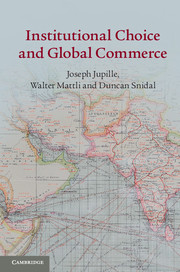7 - Conclusion
Overview and institutional theories compared
Published online by Cambridge University Press: 05 June 2014
Summary
Introduction
We have argued in this book that institutional choice in global commerce is molded to a large extent by the institutional status quo: already existing venues shape responses to new cooperation challenges and the unfolding politics and economics of institutional choice. Cooperation problems do not move frictionlessly from dilemma to institutional optimum. Instead, boundedly rational actors fold forward a Use-Selection-Change-Creation (USCC) decision tree, contemplating riskier institutional choices, such as Change and Creation, only as prior strategies fail to provide “good enough” solutions to the cooperation problem.
In this conclusion, we first provide an overview of the evidence in support of USCC conjectures (summarized in Table 7.1). The cases confirm the remarkable staying power of the institutional status quo and the long shadow it casts on future institutional choices. New choices do not spring from a tabula rasa. Actors are embedded and operate in institutional settings that most of the time produce “good enough” solutions. When these settings manifestly fail to adequately deal with a new cooperation challenge, Change becomes possible. Even then, however, the institutional past and present have a powerful voice in shaping the future. The empirical analysis also confirms the centrality and usefulness of the foundational behavioral assumption of USCC theory. Boundedly rational actors frequently do not know what they do not know at critical junctures – knowledge that traditional rational choice theory assumes them to possess. The implications are borne out nicely in the empirics: in cases where the lack of knowledge pertains to the severity of future distributional consequences of a new institutional equilibrium, agreement is relatively swift and easy but subsequent modification inevitable and contentious.
- Type
- Chapter
- Information
- Institutional Choice and Global Commerce , pp. 199 - 216Publisher: Cambridge University PressPrint publication year: 2013



